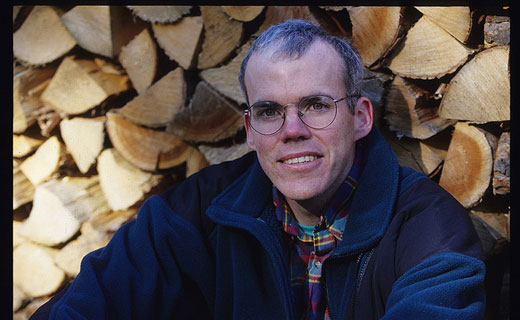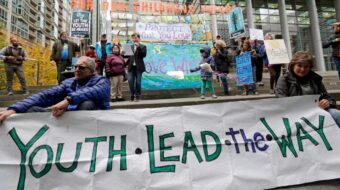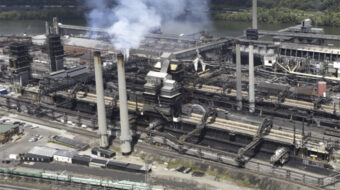
Bill McKibben plays a vital role in the environmental movement. He has written several important books, including “The End of Nature” and “Eaarth, Making a Life on a Tough New Planet” (yes, that’s “Eaarth” with two a’s). He founded 350.org, an international Internet-based organization which has sponsored worldwide demonstrations calling for a return to no more than 350 parts per million of carbon dioxide in the atmosphere, which is essential if the planet is to avoid the worst effects of climate change. As an activist, and thinker, his contributions have international significance.
The role he and 350.org are playing in the fight against the Keystone XL tar sands pipeline project is central. This struggle will only intensify since Nebraska’s governor, Dave Heineman, recently approved building the pipeline across sensitive areas of Nebraska’s piece of the giant Oglalla Aquifer, which tens of millions of people rely on for fresh water and agricultural irrigation.
In a recent column at the Huffington Post, McKibben encourages people to join him at a major demonstration in Washington, D.C., on President’s Day 2013. He also praises the work on almost 200 campuses where student groups are fighting to get their colleges and universities to divest funds from investments in fossil fuel companies.
But he has three weaknesses, all on exhibit in that column.
One: He places the struggle against President Obama as the central one for environmentalists today. He is correctly worried about how the Obama administration will deal with the Keystone XL pipeline, but he sees Obama and his perceived lack of leadership on climate change issues as the main problem. As Obama made clear in his second inauguration speech, he understands the science and intends to take more action in his second term on climate change issues.
This matches well with the intentions of Ban Ki-Moon, UN secretary-general, who said recently, “Climate change is fast happening – much, much faster than one would have expected. Climate and ecosystems are under growing strain.” Moon puts climate change as one of his top priorities for world action in 2013, seeking a new, binding international treaty on climate change.
Harry Reid, Senate majority leader, included action on climate change among the first 10 bills he will place before the new Senate. Vice President Joe Biden, at an inaugural “Green Ball,” insisted that “there is science in the White House” and urged environmentalists to “keep the faith.”
Of course the environmental movement and its allies need to pressure Obama, but Obama is not the main obstacle to action on climate change – the right wing and its science-denying propagandists, funded by fossil fuel companies, are the source of the problem, the source of the main opposition to action. Obama’s actions on the environment have been positive and real, even if it will be a real challenge to implement the changes we need, as Obama stressed in his inaugural speech.
To build the broadest movement requires winning millions who were part of the Obama re-election victory. And placing an attack on him and his administration as central to progress will push them further away from their natural allies in the environmental movement.
Two: McKibben sees people in general as his target audience. This is understandable, since people in general will all be negatively affected by environmental problems. But to create fundamental change requires winning a majority of workers and building real connections with their unions. That requires environmental campaigns that make a jobs program central. Blaming unions in part for the delay in raising automobile emission standards, while it has an element of truth, is not the strongest way to win an argument for the labor movement to fully engage in alliances with environmentalists.
People in general can accomplish much. They can demonstrate and protest, sign petitions, write letters, blog, vote and canvass for votes, educate neighbors, and connect worldwide environmental issues to local issues.
But only workers have the power to shut down the economy. Only workers, when organized, have the power to transform the system.
Three: He places climate change struggles in competition with other struggles, arguing that action of global warming should take precedence over other struggles, like the one for universal health care coverage – rather than making the argument for the connections between climate change and other struggles. That’s a sure way to discourage allies whose main focus is and will continue to be those other struggles.
All progressive struggles have an environmental component, and successful alliances have been built by joining environmental programs with jobs programs – uniting environmental concerns with economic ones, uniting environmental and labor organizations. Environmental and civil rights organizations can find common ground in fighting environmental racism. Worldwide environmental issues can be joined with struggles for peace and justice worldwide.
This holds true for the other sides of these coalitions – they too need to reach out and make alliances with environmental organizations, rather than caricaturing them as against jobs, against progress on other issues, primarily white not only in membership but in concerns-as if environmental problems are a racial issue. Of course the environmental movement needs to expand, reach out, build alliances, and so do all these other groups. It is up to all of them to find common ground and engage in mutual support.
Participating in the important national demonstrations against the Keystone XL tar sands pipeline is one way to move more people into action, and for people from all parts of society to join with environmental activists. Short-term job growth that forces people to engage in work that is harmful to their own long-term survival is wrong, and there are better ways to create jobs. Making that clear is the path for the environmental movement to take.
Photo: Bill McKibben. Nancy Bataglia/350.org CC 2.0










